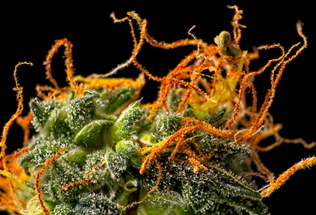Posted by Alex Chen - Cannabis Research Specialist on 7th Sep 2023
Unveiling the Potential of THCA: Benefits, Uses, and More
In the realm of cannabis, there's more than meets the eye – or rather, the high. While THC and CBD have taken the spotlight, another cannabinoid, THCA, has been quietly garnering attention for its intriguing properties and potential health benefits. In this comprehensive guide, we'll delve into the world of THCA, exploring its origins, unique characteristics, therapeutic potential, and much more.
THCA: A Closer Look
Tetrahydrocannabinolic acid, or THCA, is a naturally occurring cannabinoid found in raw and unprocessed cannabis plants. Unlike its famous counterpart THC (tetrahydrocannabinol), THCA doesn't induce the psychoactive effects commonly associated with cannabis consumption. Instead, it serves as the precursor to THC, undergoing a transformation through the process of decarboxylation, wherein heat removes a carboxyl group and converts THCA into THC.
The Chemistry of Transformation
THCA's journey from an inert precursor to an active compound begins with the cannabis plant's growth. As the plant matures, it produces CBGA (cannabigerolic acid), which acts as a precursor to various cannabinoids, including THCA. The molecular structure of THCA contains an additional carboxyl ring, rendering it non-intoxicating. Upon exposure to heat – such as smoking, vaporizing, or baking – decarboxylation occurs, breaking down the carboxyl group and transforming THCA into the well-known THC.
Beyond the High: Potential Benefits
While THCA itself doesn't induce a high, emerging research suggests it may offer a range of potential health benefits. Some of these include:
- - Anti-Inflammatory Properties: THCA has shown promise as an anti-inflammatory agent, which could have implications for conditions like arthritis and autoimmune disorders.
- - Neuroprotective Effects: Research indicates that THCA might have neuroprotective properties, potentially offering support for neurodegenerative conditions like Parkinson's disease.
- - Anti-Nausea and Anti-Vomiting: THCA's anti-emetic properties may provide relief from nausea and vomiting, making it beneficial for cancer patients undergoing chemotherapy.
- - Pain Management: Preliminary studies suggest that THCA could contribute to pain relief, making it a potential option for individuals dealing with chronic pain.
- - Anti-Proliferative Actions: THCA's anti-proliferative effects could hold promise in inhibiting the growth of certain types of cancer cells.
Forms and Consumption
THCA-rich products are becoming more accessible, offering a unique way to experience the potential benefits of this cannabinoid. Some options include THCA tinctures, capsules, and concentrates. Additionally, incorporating raw cannabis leaves into your diet – through juices, smoothies, or salads – could provide a source of THCA.
As our understanding of cannabis compounds deepens, THCA emerges as a noteworthy player with its own set of potential benefits and uses. While further research is needed to fully unlock its therapeutic potential, THCA offers a glimpse into the intricate world of cannabinoids and their intricate interactions within the human body. As the cannabis landscape continues to evolve, THCA stands as a reminder that there's always more to discover beyond the high.
